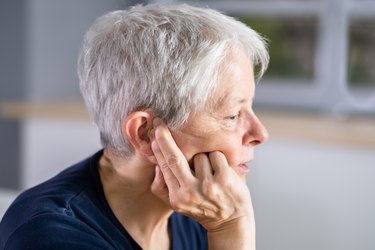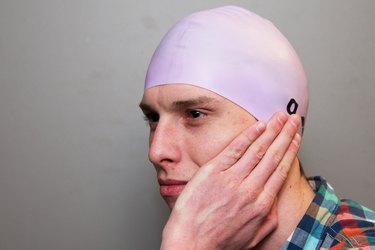
You're halfway through your workout when, all of the sudden, your ears feel plugged. You try to pop them, but alas, no luck.
If you commonly deal with clogged ear ears during exercise, it's natural to wonder, why do my ears clog up when I exercise? and think that your workouts may be the culprit. Or maybe you're sweating directly into your ear canals.
So, can exercise cause muffled hearing? As it turns out, the workout doesn't actually cause this feeling or make it more likely to happen, says Richard Rosenfeld, MD, MPH, distinguished professor and past chair and program director of otolaryngology (ENT) at SUNY Downstate.
Video of the Day
Video of the Day
Instead, it's possible that, when you're exercising, you're simply more attuned to your body and likely to notice the state of your ears.
After all, plugged ears usually mean one thing: Something's up with your eustachian (pronounced "you-stay-shee-un") tubes. These little passageways connect the middle ear to the back of your throat and are responsible for helping you maintain normal air pressure in your ears.
When the tubes are blocked or aren't able to keep up with air pressure changes (like when you're on a plane), your ears can feel plugged, explains William O. Roberts, MD, a fellow of the American College of Sports Medicine and professor emeritus of medicine at the University of Minnesota.
If your eustachian tubes are blocked you might have symptoms other than clogged ears, including muffled hearing, a popping or clicking sensation, ear pain, ringing or even trouble maintaining your balance, according to the American Academy of Family Physicians.
The good news is that if you have plugged ears during exercise, there are simple remedies to unclog your ears when exercising (or after your session). Here's why your ears might feel plugged during or after a workout — and how to find relief.
1. You've Got a TMJ Disorder
TMJ is short for the temporomandibular joint — that's your jaw joint. When you talk and chew, your TMJ jiggles your ear canal, expelling ear wax, Dr. Rosenfeld explains. And that's a good thing.
But, he says, a lot of adults grind their teeth at night or clench their teeth during the day if they're under a lot of stress.
"That's rough on the jaw," he says, pointing out that regularly eating chewy or tough foods (yes, bagels) can irritate the joint as well and cause the ears to randomly feel clogged.
Over the long term, strenuous exercise during which you clench your teeth might contribute to a TMJ disorder, and subsequently, the feeling of plugged ears during exercise, Dr. Rosenfeld says.
"If you're clenching up and grinding your teeth, maybe during a high-intensity workout, that could potentially make your ears [as a result of a TMJ disorder] worse," he says.
Fix It
While it's important to see your doctor to get to the root cause of a TMJ disorder (stress, for example), there are ways to relieve the pain, per the University of Michigan.
Rest your jaw, eat soft foods that don't require a lot of chewing, try an over-the-counter pain reliever and consider wearing a night mouth guard. Mouth guards are designed to reduce clenching and grinding, according to the University of Michigan.
As for preventing that grinding, clenching and plugged ears during exercise? Remember to breathe (especially when lifting weights). Taking deep breaths will help relax your body, and yes, your tight jaw.
2. You Have Allergies or an Upper-Respiratory Infection
When you talk, swallow or yawn during your workout, your eustachian tubes will open to let air inside, maintaining the air pressure. But when you have allergies, a cold or a chronic sinus infections, for example, the entrance to the tubes can become swollen. That can limit the flow of air into the tubes and middle ears, causing a clogged sensation.
And while you can continue to exercise if you have clogged ears due to a cold or allergies, Dr. Rosenfeld says, if it reaches a point that's painful or your hearing declines, it's time to see a doctor. Just remember, it's your ears, not your exercise that's behind it.
Fix It
An exercise called the valsalva maneuver can help pop your ears and restore air pressure, Dr. Roberts says. And, funnily enough, it's a common breathing technique used during heavy lifting workouts.
To try the valsalva, exhale against a closed airway. If it helps, you can close your mouth and pinch your nose. Then gently blow like you're blowing your nose.
A lesser-known clogged ear remedy is the modified valsalva maneuver, to unclog just one ear: Hold your nose, close your mouth and tilt the clogged ear upward, and gently blow, Dr. Rosenfeld says.
You can also try chewing gum or drinking water, according to the University of Michigan. If none of these remedies is effective, Dr. Roberts recommends a nasal spray to reduce swelling and open the tube entrance.
In more extreme cases, a doctor can force air into the tube to relieve your ear pressure.
Tip
If you try to pop your ears using the valsalva maneuver and it's completely ineffective, it's likely not an ear problem that's making you feel clogged, Dr. Rosenfeld says.
3. Your Ear Canal Is Blocked With Wax
If your workout isn't complete without your trusty earbuds, you might think they're to blame if your ears feel a little clogged. After all, couldn't they push your wax deeper into your ears? Unlikely, Dr. Rosenfeld says.
"Your ear canal is about an inch deep, and wax is produced only in the outer third," he explains. "Earbuds don't go deep enough to impact the wax."
That said, you'll want to think twice before you reach for a cotton swab to clean out that yellow-orange wax, Dr. Roberts says.
"Ear wax is Mother Nature's ear canal cleaning mechanism," he says. "The wax is produced by cells in the ear and carries materials out as it drains."
When you try to clean your ears with a cotton swab, you might end up just pushing the wax back into the ear, causing blockage, Dr. Roberts explains. Impacted wax might also make it harder for you to hear as well as you normally do, Dr. Rosenfeld says.
Fix It
If your clogged ears are caused by impacted or excessive ear wax, your doctor can take a closer look and remove excess wax as needed, Dr. Roberts says.
To prevent wax impaction, avoid sticking a cotton swab, your finger or other objects into the canal. Instead, use a warm cloth to gently wipe away ear wax that has made its way to the outer ear.
When to See a Doctor
If this isn't just an exercise problem, it's time to talk to a health care professional if the plugged-up sensation doesn't resolve within two weeks, according to the Mayo Clinic. You should also see a doctor if the clogging feels severe or is accompanied by any ear pain.
Was this article helpful?
150 Characters Max
0/150
Thank you for sharing!
Thank you for your feedback!


